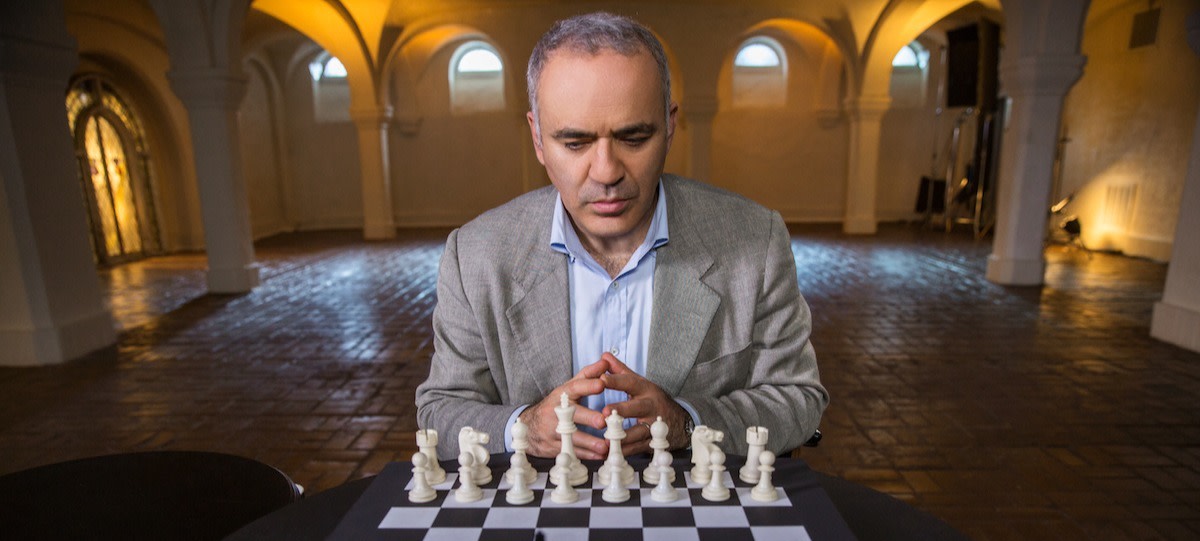A Guide to Chess Player Garry Kasparov’s Life and Career
Written by MasterClass
Last updated: Jul 22, 2021 • 4 min read
Garry Kasparov is an Azerbaijani professional chess player who has staged some gripping matches in his decades-long career. Some of his career highlights include: becoming the world’s youngest person to win the World Chess Championship in 1985 and facing off in a chess match against a supercomputer.
Learn From the Best
A Brief Introduction to Garry Kasparov
Garry Kasparov is known by many as the greatest chess player of all time. Born in Baku, Azerbaijan in 1963, Garry demonstrated a remarkable gift for the game of chess as a child. He learned by watching his parents play, and was soon challenging his uncle and solving chess problems in the newspaper. At the age of 12, he became the under-18 chess champion of the USSR, and at 17, World Junior Champion, along with chess grandmaster. He became the youngest World Chess Champion in history in 1985 at the age of 22.
One of Garry’s first mentors was Mikhail Botvinnik, a Soviet and Russian International Grandmaster and World Chess Champion for three different periods from 1948 to 1963. While he was still learning chess, Garry read and was inspired by Soviet Grandmaster David Bronstein’s 200 Open Games (1973). Kasparov held onto the title of world’s highest-rated player until his retirement from professional chess in 2005. In 2017, Garry teamed up with American chess author Mig Greengard to write an analytical memoir called Deep Thinking: Where Machine Intelligence Ends and Human Creativity Begins about his highly-publicized match against the IBM supercomputer Deep Blue.
7 of Garry Kasparov’s Most Famous Matches
After three decades in chess, Garry Kasparov has his own unmistakable style. In addition, he has a number of notable and intriguing matches under his belt. Some of his best chess games include the following.
- 1. World Chess Championship (1984): Garry’s 1984 World Championship match against Anatoly Karpov in Moscow, Russia, was controversially ended after 48 games with no clear victor. After 27 games, the score was five wins for Karpov and 22 draws. Garry hung on to win game 32 and then draw another 14 games before winning games 47 and 48. The International Chess Federation chose that moment to abort the marathon match that ran from September 10, 1984 to February 8, 1985. After the scandal settled, a new match, limited to 24 games and starting at 0-0, was scheduled for later in the year.
- 2. World Junior Chess Championship (1985): Following his defeat at the hands of Karpov the previous year, Kasparov clinched the World Chess Championship rematch against his rival in 1985. At that point, he became the world’s youngest chess champion at the age of 22.
- 3. World Chess Championship (1987): Competing in Seville, Spain, Kasparov and Karpov once again faced off in a dramatic chess match, with the score tied after 22 of 24 games. Karpov won game 23 to take the lead, making game 24 do-or-die for Kasparov. Kasparov was eventually able to pull off the victory, winning the final game to tie the match, holding onto his title as reigning world champion.
- 4. Tilburg Chess Tournament (1989): In his 1989 match against Jeroen Piket in the Netherlands, Kasparov used the King’s Indian Defense to create a big attack, which he pulled off successfully and eventually led to his winning the game.
- 5. World Chess Championship (1993): Garry squared off against Nigel Short at the Savoy Theatre in London for this match. Instead of playing the game under the FIDE, which is the official world governing body of chess, they played under the rival organization, the Professional Chess Association (PCA). In their first match under the new organization, Kasparov defeated Short 12.5–7.5.
- 6. PCA World Chess Championship (1995): In his 1995 match against Viswanathan Anand in Riga, Latvia, Garry infamously used Evans Gambit, an aggressive opening that he made more popular by his 25-move defeat of his opponent.
- 7. Garry Kasparov vs. Deep Blue (1996): In 1996, Garry faced off against the IBM supercomputer Deep Blue, the first computer programmed to operate as an AI player. They faced off for the first time in Philadelphia in 1996, playing a six-game match against one another, with Kasparov emerging as the victor 4–2. However, in 1997, they faced off again in a rematch, with Kasparov suffering defeat against the artificial intelligence (3.5–2.5), which marked the first defeat of a World Chess Champion (under tournament conditions) by a computer. Garry’s matches in 1996 and 1997 with IBM’s Deep Blue chess computer rocked the chess and computer science communities to their cores, but Garry insists that this impact is irrelevant to the game’s value and popularity for human players. Computers are invaluable study aids, but at the board between two human players, chess is a psychological game and a competitive sport, not an equation to be solved.
Learn More
Get the MasterClass Annual Membership for exclusive access to video lessons taught by the world’s best, including Garry Kasparov, Daniel Negreanu, Stephen Curry, Serena Williams, and more.
